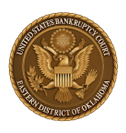The information outlined below is intended to give debtors and creditors an introduction to the bankruptcy process and laws. If you are considering filing bankruptcy, you may also be interested in viewing the video presentations found on the United States Courts Web site that describe the bankruptcy process and your options.
Legal Advice
Bankruptcy can be complicated. The staff of the U.S. Bankruptcy Court Clerk's office provides a variety of services; however they are not permitted to assist with the preparation of the voluntary petition, schedules, or other documents, nor can they provide legal advice. All parties must comply with the Local Bankruptcy Rules, Administrative Procedures and General Orders for the Eastern District of Oklahoma, the U.S. Bankruptcy Code and the Federal Rules of Bankruptcy Procedure. Failure to do so will result in dismissal of the case, or other sanctions. The public library may have law books that may be of assistance. If you wish to retain an attorney, call the Oklahoma Bar Association: 1-800-522-8065 or visit the Oklahoma Bar Association Web Site.
Role of Trustees
There are two different types of trustees involved in bankruptcy cases: case trustees and the United States trustee; each plays a different role in the bankruptcy process.
Case Trustee
In every chapter 7, 12, and 13 case a case trustee is appointed when the bankruptcy petition is filed. This trustee does not represent the debtor or any individual creditor. Rather, the trustee has independent rights and duties that are set forth in bankruptcy code.
Case trustees and their staff are not permitted to give legal advice to the debtor or the creditors.
United States Trustee
The Office of the United States Trustee(link is external) (UST) oversees the administration of the bankruptcy laws on behalf of the Attorney General of the United States. The UST has standing to raise any issue and be heard in any case under the bankruptcy code. Among the Trustee's duties are selecting and supervising the panel of case trustees, monitoring the progress of chapter 11 reorganization proceedings, monitoring applications for compensation, and notifying the United States Attorney of suspected bankruptcy crimes.
The United States trustee and staff of the Office of the United States Trustee are not permitted to give legal advice to the debtor or the creditors.
Meeting of Creditors and Notice of Deadlines
- Notice of bankruptcy case filing, meeting of creditors, & deadlines will be sent to the debtor and all creditors listed on the matrix within 5 to 10 business days. Pro se debtors should also be familiar with Bankruptcy Code §521 and
- Bankruptcy Rule 4002.
Bankruptcy is a set of federal laws and rules that can help individuals and businesses who owe more debt than they can pay. Each of the 94 federal judicial districts handles bankruptcy matters, and in almost all districts, bankruptcy cases are filed in the bankruptcy court. Bankruptcy cases cannot be filed in state court. Bankruptcy laws help people who can no longer pay their creditors get a fresh start by liquidating their assets to pay their debts, or by creating a repayment plan.
Bankruptcy laws also protect troubled businesses and provide for orderly distributions to business creditors through reorganization or liquidation. These procedures are covered under Title 11 of the United States Code (the Bankruptcy Code). The vast majority of cases are filed under the three main chapters of the Bankruptcy Code, which are Chapter 7, Chapter 11, and Chapter 13.
Federal courts have exclusive jurisdiction over bankruptcy cases. This means that a bankruptcy case cannot be filed in a state court.
The primary purposes of the law of bankruptcy are:
- to give an honest debtor a "fresh start" in life by relieving the debtor of most debts, and
- to repay creditors in an orderly manner to the extent that the debtor has property available for payment.
Some bankruptcy cases are filed to allow a debtor to reorganize and establish a plan to repay creditors, while other cases involve liquidation of the debtor's property.
A bankruptcy case normally begins by the debtor filing a petition with the bankruptcy court. A petition may be filed by an individual, by a husband and wife together, or by a corporation or other entity. The debtor is also required to file statements listing assets, income, liabilities, and the names and addresses of all creditors and how much they are owed. The filing of the petition automatically prevents, or "stays," debt collection actions against the debtor and the debtor's property. As long as the stay remains in effect, creditors cannot bring or continue lawsuits, make wage garnishments, or even make telephone calls demanding payment.
Creditors receive notice from the clerk of court that the debtor has filed a bankruptcy petition. Some bankruptcy cases are filed to allow a debtor to reorganize and establish a plan to repay creditors, while other cases involve liquidation of the debtor's property. In many bankruptcy cases involving liquidation of the property of individual consumers, there is little or no money available from the debtor's estate to pay creditors. As a result, in these cases there are few issues or disputes, and the debtor is normally granted a "discharge" of most debts without objection. This means that the debtor will no longer be personally liable for repaying the debts.
In other cases, however, disputes may give rise to litigation in a bankruptcy case over such matters as who owns certain property, how it should be used, what the property is worth, how much is owed on a debt, whether the debtor should be discharged from certain debts, or how much money should be paid to lawyers, accountants, auctioneers, or other professionals. Litigation in the bankruptcy court is conducted in much the same way that civil cases are handled in the district court. There may be discovery, pretrial proceedings, settlement efforts, and a trial.
